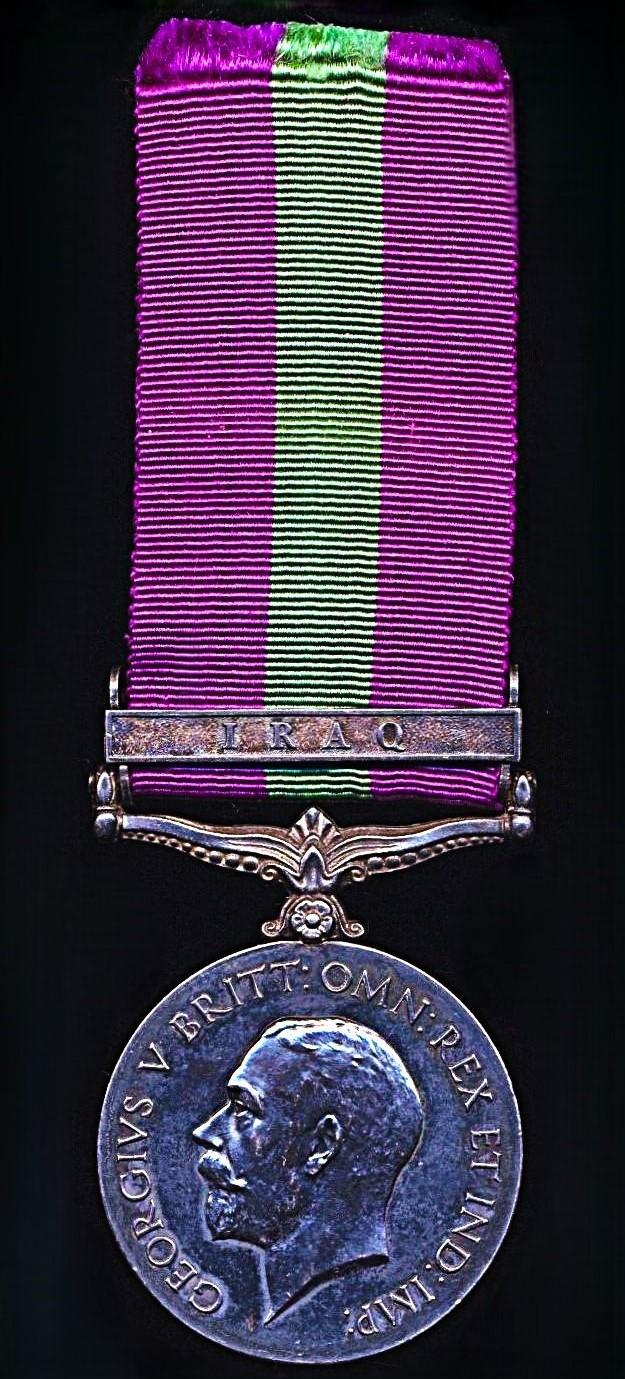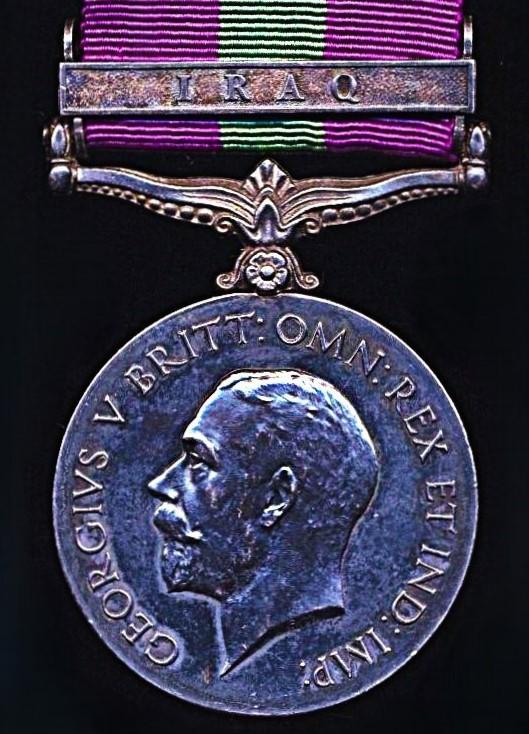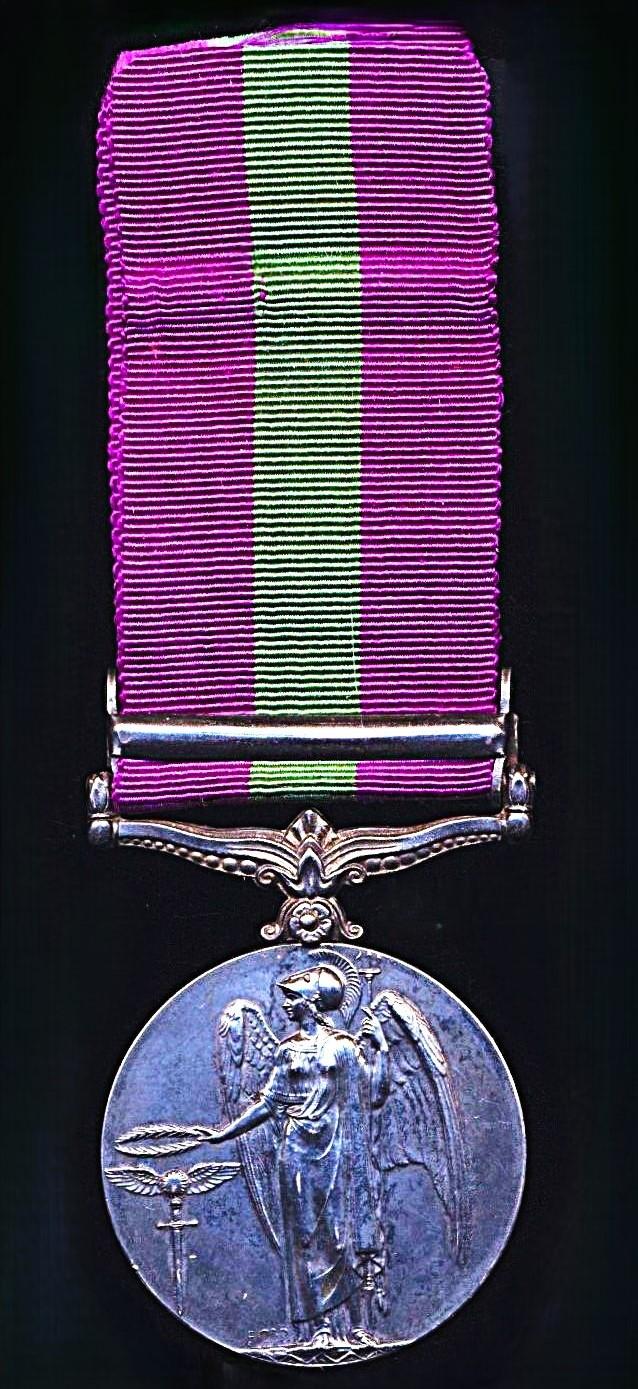General Service Medal 1918-62. GV first issue with clasp 'Iraq' (62529 Pte. W. Timperley, Manchester Regt.)
Wounded-in-Action: Private William Temperley, 2nd Battalion Manchester Regiment, is confirmed to have been 'Wounded-in-Action' by gunshot and shrapnel wound (or GSW) to the left ankle / foot, during the Battle of Hillah, Iraq, 24 July 1920 (the recipient's extant service papers refer). The severity of the wound was subsequently graded as affecting the recipient by loss of 20% physical capacity
Battle of Hillah, Iraq, 24 July 1920: The British force that fought on that fateful day - a British defeat - and a Victoria Cross action for the Manchester Regiment, were all members of the 'Manchester Column' that comprised:
- 35th Scinde Horse (two squadrons)
- 39th Battery Royal Field Artillery ( 2 x sections)
- 2nd Battalion Manchester Regiment (3 x companies)
- 1st Battalion 32nd Sikh Pioneers (1 x company)
- 24th Field Ambulance (1 x section)
Together with a 'Transport Train' the total number of 'All-Ranks' present in the Manchester Column would have been about 1050-1100 men. The Iraqi Arab nationalist enemy has been reported to have been as much as 5000
Initial casualty returns, reported the British & Indian losses at Hillah to have been
- 2/Manchester: 12 x killed, 26 x wounded & 207 x missing
- Indians: 8 x killed, 34 x wounded & 81 x missing
- Transport Drivers (Indian?): 30 x missing
Sadly, the unfortunate euphemism 'missing' disguised an ultimately predictable rise in the death toll credited to the Battle of Hillah. Of the 318 missing, only 160 were released at various times by their captors - the balance 140 x 'All-Ranks', British & Indian, missing, were believed to have been variously tortured, ill-treated and died in captivity. Of those, the Manchester's suffered losses of 100 x men died at the hands of the Arab enemy
A posthumous Victoria Cross was awarded to Captain George Stuart Henderson, D.S.O.*. M.C., 5 x M.I.D., a Scottish born officer and Company Commander of 2/Manchester Regiment. His Victoria Cross was published with citation in the London Gazette issue of 29 October of 1920:
Quote,
For most conspicuous bravery and self-sacrifice. On the evening of the 24th July, 1920, when about fifteen miles from Hillah (Mesopotamia), the Company under his command was ordered to retire. After proceeding about 500 yards a large party of Arabs suddenly opened fire from the flank, causing the Company to split up and waver. Regardless of all danger, Capt. Henderson at once reorganised the Company, led them gallantly to the attack and drove off the enemy. On two further occasions this officer led his men to charge the Arabs with the bayonet and forced them to retire. At one time, when the situation was extremely critical and the troops and transport were getting out of hand, Capt. Henderson by sheer pluck and coolness, steadied his command, prevented the Company from being cut up, and saved the situation. During the second charge he fell wounded, but refused to leave his command, and just as the Company reached the trench they were making for he was again wounded. Realising that he could do no more, he asked one of his N.C.O s to hold him up on the embankment, saying ' I'm done now, don't let them beat you'. He died fighting.
Unquote.
Medal & Clasp Verification: The medal and clasp to 62529 Pte. W. Timperley, 2nd Battalion Manchester Regiment, who did not serve overseas during the Great War, is confirmed as his full medal entitlement, per the respective medal roll referenced below:
- GSM 1918-62. With clasp 'Iraq': WO 100/G6/416. The medal roll compiled at Preston, 18 February 1924
The recipient's service papers are extant and accessible at The National Archives in file series WO97
William Timperley son of George Timperley and Timperley (nee) was born at Mayfield, Staffordshire, England on 20 January 1900. By 1911 the Timperley family had re-located to Ancoats, Manchester, where his father was employed in the cotton mills. William first attested for the British Army 'For Duration of War' on 21 January 1918, at which time he was described as a Labourer, and residing with his father and siblings at Wolsley Street, Ancoats, Manchester. On mobilization, 27 February 1918, he was posted to the 5th Battalion Manchester Regiment and given the regimental number 62529. Due to his age, he did not subsequently serve overseas on active service during the Great War. He took his initial discharge on 26 February 1919. The following day, 27 February 1919, he re-enlisted at Scarborough, England, into the Manchester Regiment (and retaining the same regimental number). Subsequently posted to the 2nd Battalion Manchester Regiment (he was renumbered No. 3514367), his record of service and postings was:
- Home: 27/02/1919 - 12/02/1920
- Mesopotamia (Iraq): 13/02/1920 - 25/09/1920
- Home: 26/09/1920 - 16/11/1920
During his service in Iraq, William fought - and bled - with his battalion at the Battle of Hillah, where on 24 July 1920, he received a Gunshot & Shrapnel Wound' to his left ankle / foot. Such was the severity of the wound, that William was discharged as medically unfit for further service, with wounds graded as causing 20% disability with regards to his ability to carry out his pre-war work as a Labourer & Cotton Operative in the Cotton Mills (he had prior worked at Messrs Bazley Bros (Cotton Mills) located at Pollard Street, Ancoats, Manchester, England.
A choice 'Battle of Hillah' Manchester Regiment casualty medal - and the recipient's full medal entitlement - virtually pristine with fine overall patination, and never prior messed around with
Condition: Toned EF
Code: 25447







